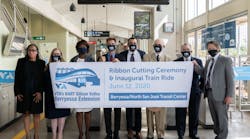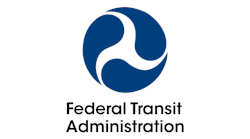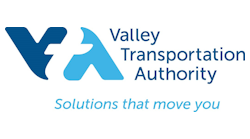The Federal Transit Administration (FTA) issued a Letter of Intent (LOI) to Santa Clara Valley Transportation Authority (VTA) stating its intention to obligate funds to the authority’s planned Bay Area Rapid Transit (BART) Silicon Valley Phase II project, which is the first project to enter FTA’s Expedited Project Delivery (EPD) Pilot Program.
"The San Francisco - Silicon Valley corridor is one of the busiest and most economically significant in the nation," said U.S. Transportation Deputy Secretary Polly Trottenberg. "This announcement is a big step towards more transit options, a better commute and cleaner air for Bay Area residents."
The LOI outlines a series of conditions Santa Clara VTA must meet before the FTA enters a Full Funding Grant Agreement (FFGA) with the authority. Prior to the project's consideration for an FFGA, Santa Clara VTA must:
Secure and document the commitment of all non-federal funding for the project and submit revised financial information as outlined in the requirements in the Notice of Funding Opportunity, based on the revised cost and revised revenue service date; and
Provide updated information regarding BART's system-wide operations and maintenance costs and funding sources, given that BART will operate and maintain the project.
With the LOI issued, Santa Clara VTA can advance the project’s engineering and perform early work such as relocate utilities, acquire real estate and procure vehicles. The authority can also proceed with contract advertisements and awards, including the largest procurement, the tunnel contract, which includes the design and construction of the subway through downtown San Jose with a large-diameter tunnel boring machine.
“After decades of planning and strong public support, [Santa Clara] VTA is honored to have the FTA acknowledge the substantial merits of the BART extension to downtown San Jose and Santa Clara,” said Santa Clara VTA Board Chair Glenn Hendricks. “We are excited to continue to move this important project forward.”
The Phase II project will extend BART service from Berryessa Station in northeast San Jose through downtown and into Santa Clara. The phase includes four stations, a maintenance facility and five miles of subway tunnel. Phase I of the project opened for service in June 2020 and passenger service on the second phase is planned to begin in 2030.
FTA's EPD Pilot Program is a discretionary program aimed at expediting delivery of new transit infrastructure projects that utilize public-private partnerships, are planned to be operated and maintained by employees of an existing public transportation provider and have a federal share not exceeding 25 percent of the project cost.
FTA says the maximum federal share of the project would be $2.287 billion or 25 percent of the final project cost (whichever is less). FTA expects the final project cost to be $9.148 billion. Santa Clara VTA’s 2020 funding plan for the project requested funding of $1.735 billion based on a $6.9 billion eligible budget. The authority anticipates a cost increase over preliminary estimates “not least of all because of the impact of the pandemic on materials, supply chains and energy.”
FTA explains it is required by law to evaluate proposed EPD Pilot Program projects against several criteria and ensure that the prospective grant recipient demonstrates the technical, legal and financial capability to implement the project. FTA also says it will continue to work closely with Santa Clara VTA to further advance the project toward an FFGA under the EPD Pilot Program.







